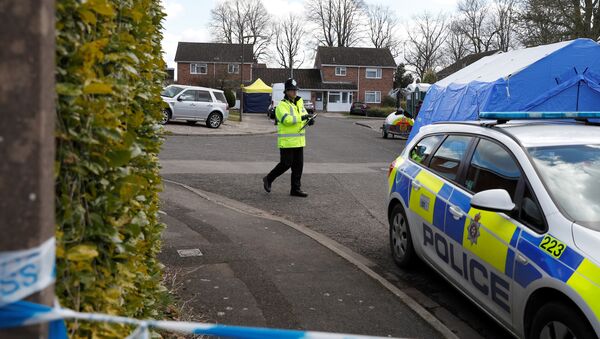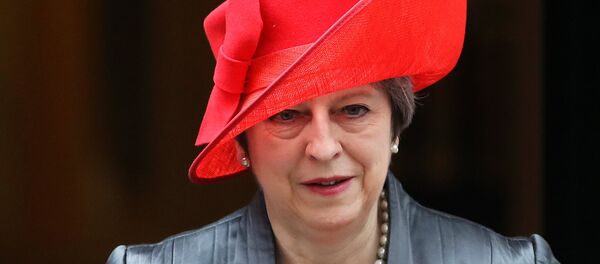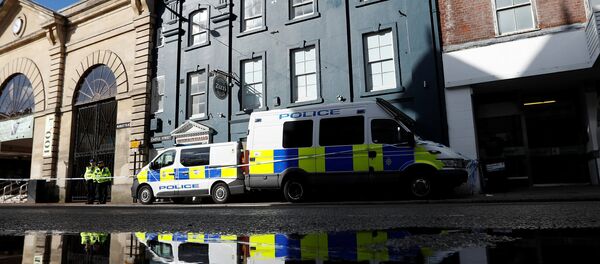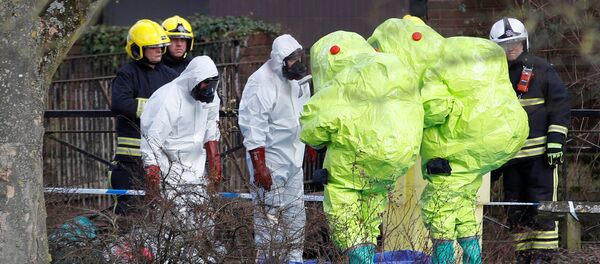Former officer of Russia's Main Intelligence Directorate (GRU) Sergei Skripal and his daughter Yulia were found unconscious earlier in March on a bench at a shopping center in Salisbury, located in the southern English county of Wiltshire. The two of them remain in critical condition and are receiving treatment for suspected exposure to a chemical.
Accusations Against Moscow
UK Prime Minister Theresa May said Monday that it was "highly likely" that the Russian government was behind the recent poisoning in Salisbury, although she did not provide any proof.
READ MORE: UK Media Compete to Think Up Most Menacing Response to Russian Spy's Poisoning
However, the assassination attempt might in reality be "the dirty tricks" by the UK intelligence agencies aimed at discrediting Russia, the leader of the German Civil Rights Movement Solidarity party said.
Alexander Litvinenko, a former officer of the Russian Federal Security Service who defected to the United Kingdom, died from radiation poisoning in 2006. Russian Foreign Minister Sergey Lavrov noted last week that the United Kingdom was drawing parallels between the incident with Skripal and the death of Litvinenko and pointed out that the 2006 case, also blamed on Russia, was not fully investigated.
Russian Trace Unlikely
The theory of Russian involvement in the incident has several logical faults, Professor Marcello Ferrada de Noli, publisher of the geopolitical magazine The Indicter, said.
"British spy Skrypal has been exposed, already pardoned, allowed to go abroad, and he did not pose any danger – not any longer – to Russian national security," de Noli explained.
The scholar added that several former Russian intelligence officers were living peacefully in the United Kingdom or the United States.
READ MORE: Britain's Toxic Agenda for Russian Media
"Even considering – only for the argumentation’s sake – Prime Minister May’s assumption that Russia would have wished to get rid of British spy Skripal, it appears absurd that Russia would have preferred ‘to send a hit squad to England’ and risk a major international incident… instead of punishing him quietly while he was under custody in Russian territory," de Noli said.
"If we know anything about the Russian state, [it] is that it is not stupid. So why it would commit a completely stupid act on the eve of the Russian presidential election and the World Cup in such a manner?" Sussman said.
On the other hand, Gerard Batten, acting leader of the UKIP, said that he agreed with May's assessment of Russia's alleged role in the incident.
"It's either a murder directly sponsored from the Russian state or indirectly sponsored by the Russian state. They've got form for it, it goes back to 1921, it's nothing new; they've been murdering people with chemicals and poisons since the earliest days of the Soviet Union," Batten told Sputnik.
"I think genuinely we would like there to be another explanation but at the end of the day we have to face the truth whatever that is. I don't think anyone wants to engage in a diplomatic spat with Russia, but it appears we may have no other option," Sidney Cordle, the party’s leader, said.
Mysterious Substance
According to May, the substance, used in the incident, was identified as a military-grade nerve agent of the so-called Novichok group, developed in Russia.
However, this kind of nerve agent was originally produced not in Russia, but in the former Soviet Republic of Uzbekistan, de Noli pointed out.
READ MORE: Lavrov: UK Rejects Russia's Demand on Granting Access to Skripal Case Docs
"After its independence in 1991, Uzbekistan has been working together with the United States to sanitize the locations where Novichok was produced and tested. The possibility of smuggling of the nerve agent out of Uzbekistan cannot be ruled out," the expert said.
According to de Noli, the ingredients for the substance could be transported separately, therefore, with lesser risk of detection.
"However, trying to make the current government of Russia accountable for what would have possibly happened in Uzbekistan during period of 1991 and around, is far-fetched and also illegitimate," the expert concluded.
Investigation
According to de Noli, the investigation into the attack on Skripal needs to be carried out solely by the UK authorities.
"Nevertheless, it has to be conducted with transparency, and any evidence to be reached has to be verifiable by other parties. Within those premises, a cooperation [between Russia and the United Kingdom] is both feasible and desirable," de Noli.
"Unfortunately, we have seen this as a new trend in disputes of geopolitical character," de Noli said.
The relationship between the United Kingdom and Russia has been tense lately because of differences over the internal conflict in Ukraine, Crimea's reunification with Russia and amid UK suspicions that Russia may have influenced the Brexit referendum. Russian officials have repeatedly stressed that Moscow does not meddle in the internal affairs of other countries.
Views and opinions expressed in this article are those of the contributors and do not necessarily reflect those of Sputnik.





